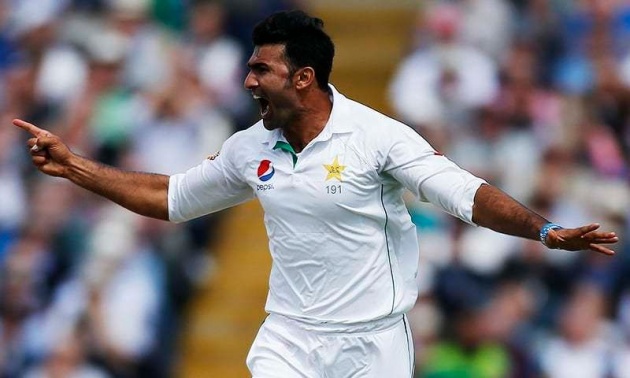ANIK BASU — UPDATED AUG 10, 2016 12:40PM
WHATSAPP
48 COMMENTS
EMAIL
PRINT
Sohail Khan. —Reuters
I was one among a crush of journalists crammed into the media room at the Eden Gardens in Kolkata the day Shahid Afridi’s foot-in-mouth disease relapsed. It was ghastly.
“I’ve not enjoyed playing anywhere as much as I have in India,” the irrepressible Afridi, as effervescent as a freshly-opened can of Coke, announced grandly.
“We have not got this much love even from Pakistan”.
It was his first press conference in India as Pakistan captain at the World T20, and Afridi wanted to leave no doubt he had come in peace. Joie de vivre and bonhomie were his leitmotif.
Folks back home thought otherwise. To them, Afridi’s comment spelt “sellout” to the Enemy.
Read: Afridi has not changed in 19 years, why expect now?
TV anchor Mubasher Lucman, all sombre and affecting his trademark “I-know-the-inside-story” posture, told his viewers Afridi was out to wrangle an IPL contract.
A lawyer by the name of Azhar Saddique served a legal notice on him on grounds of treason. Ex-players and fans bayed for his head.
In short, Pakistan exploded.
In the cacophony, the simple truth got waylaid: Shahid Afridi had tried to be grandiloquent in an alien language — English. Unfortunately, it turned out to be a misadventure.
Like author Roald Dahl’s Big Friendly Giant — that 24-foot-tall, loveable ogre who blithely mouthed incorrect English because he never went to school — Afridi, world cricket’s fading giant, might as well be saying, “What I think and what I say are two different things.”
That was all there was to it.
‘I don’t speak your language. What then? English?’
I was reminded of Afridi’s faux pas after reading about Sohail Khan’s recent presser; like most people, I too believe that the Pakistani reporter who suggested Sohail brush up his English was making too big a deal of a non-issue.
But I suppose it is not as simple with us South Asians as I make it out to be. As cricket writer Jarrod Kimber once observed:
If you are not Asian or well versed in Asian culture, you need to understand what suggesting someone [who] may not speak English means – it means they are not cultured, they are not educated.
Take the case of Rameez Raja’s unhappy experience involving him and Bangladesh opener Tamim Iqbal.
Not many Pakistanis may be aware that in general, Bangladeshi fans detest Raja; they believe he is anti-Bangladesh.
The local media, too, looks at him askance.
In February, Tamim Iqbal, playing for Peshawar Zalmi in the Pakistan Super League, was adjudged Man-of-the-Match in a Peshawar-Lahore game.
At the award ceremony, presenter Raja tried to be accommodative.
“Tamim, I don’t speak your language,” he told the Bengali-speaking star batsman. “What then? English?”
Read: Language barrier was an issue during Pakistan job, says Whatmore
Bangladeshi fans and the media were outraged.
What was Rameez Raja trying to say? Was he suggesting Tamim did not speak English? The press and social media erupted over the perceived insult.
Azad Majumder, sports editor of the Daily New Age newspaper in Bangladesh, said it was “unbecoming of a man” of Raja’s stature.
The online edition of Prothom-Alo, a Bengali daily, ran a series of articles on the issue. Not surprisingly, fans flooded the Internet with insults.
For Indian fans, however, the issue has seldom stung — perhaps mainly because their players, by and large, have been historically fluent in the English language.
Most captains since Mansur Ali Khan Pataudi’s time — save for perhaps Kapil Dev — have been immensely comfortable speaking the language.
Ever since TV interviews became commonplace, Indian captains have seldom faltered during pre-and post-match talks — Sachin Tendulkar, Sourav Ganguly, Rahul Dravid and Anil Kumble in the earlier days, and MS Dhoni and Virat Kohli now.
But does it mean all Indian players have been at home with English?
Far from it; from the earlier crop of stars, Virender Sehwag and Harbhajan Singh have been palpably awkward speaking the language before the camera.
Read: If you really thought Pakistan could beat India, you are Shahid Afridi
Many among the current lot, too, prefer Hindi over English, including Test wicket-keeper Wriddhiman Saha, whose mother-tongue is Bengali.
During the recent tour of Zimbabwe by a young Indian side under Dhoni, new-ball bowler Barinder Sran, 23, snapped 4/10 on his T20 debut to bag the MoM award.
When Zimbabwean presenter Neil Manthorp asked him if he would respond to his questions in English, Sran — a farmer’s son who studied till Class 12 in a Punjabi-medium school — laughingly called over teammate Mandeep Singh to act as the interpreter.
It was refreshing to see the young man, proud of his team colours and on-field exploits that day, confidently answering Manthorp’s queries in Hindi, and looking none the worse for it.
Maybe there is a lesson here for Bangladeshi fans who feel hurt by Rameez Raja’s polite query, and also for the Pakistani journalist who questioned Sohail’s grasp over English.
If your cricket talks, that’s all the language you need.
Follow
Umer Bin Ajmal @umerbinajmal
Sohail Khan's reply to that journalist #Pakistan #PAKvENG#Cricket #English
10:07 PM - 9 Aug 2016
3333 Retweets
1717 likes



